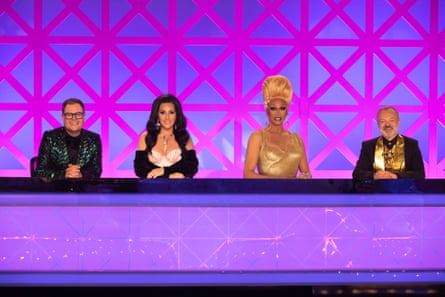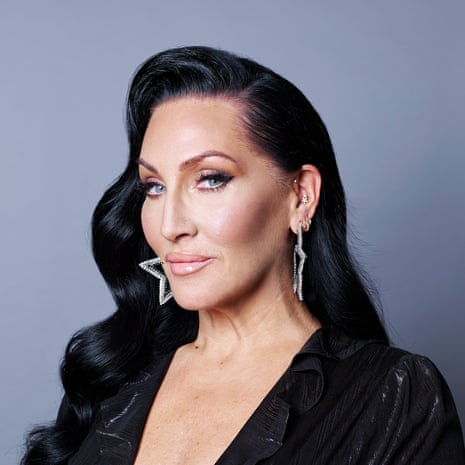Michelle Visage is, she says, a born hustler. Were you or I part of the 80s New York nightclub scene, we might have been swept away by the thrill of it all. But even at 17 – her mother had sent her a fake ID – Visage was there to work. “Fun was always involved,” she says. “But I was there to show my wares.” She wanted to get a record deal, and if that didn’t happen, she says, “I’ll be on Broadway. And if I can’t be on Broadway, well, I’ll get a movie. My dreams were ridiculous.” She laughs. “But the beauty of being a child is being able to dream big.”
It paid off – for a while at least. At 19, Visage was in a girl band with a hit single. It only lasted a year, and for the next couple of decades she built a career as a host on US radio. It wasn’t until her 40s (she’s 51), that Visage became the star she had always planned to be, as a judge on the reality show that has become a phenomenon – RuPaul’s Drag Race. In the UK, a stint on Celebrity Big Brother was followed last year by Strictly Come Dancing, the show that brought Visage to an even bigger mainstream audience. When we met, in a hotel suite, she was in London to start filming her own show for BBC Three, Get Off Your Ass, in which her no-nonsense advice is given to people who need a bit of a jolt. She was going to be hosting Drag Race’s Werq the World tour, starring nine of the show’s faces, but the dates have been pushed to later in the year.
Visage is smaller than I imagined, and while dressed down somewhat in glamorous leisurewear, is no less fabulous for it. She can talk and talk, and delivers it all with passion and laughter. There is her hair (styled), her skin (flawless), her nails (deadly), but her noticeably round-as-glitterball breasts – previously a key part of her look – are gone. Visage had her implants removed last yearbecause she believed they were connected to an autoimmune disorder she was diagnosed with in her late 20s, Hashimoto’s disease. She says she feels: “Unbelievable. My health has increased so much in just a year. My thyroid numbers are better, all my blood counts are better.” When she had her breasts done, she came round from the operation and was furious with the surgeon for not making them bigger. “I was so irate,” she says, laughing. “I didn’t want natural. I said: ‘How could you give me natural boobs?’” Does she regret having them? “No, I don’t live my life regretting.”
Visage stretches out like a cat in the sun that streams through the window. She was adopted as a baby and grew up in a loving and close Jewish family in smalltown New Jersey. Her father ran a trophy shop, and her mother was a supply teacher (Visage met her birth mother when she was 25, and they formed a close relationship). At 13, Visage got her first paid role in a play at a local theatre. “I was awkward and chunky, being made fun of, no boys liked me and all my girlfriends had already lost their virginity – yes, at 13, which is crazy but true.” Getting cast in the play made her feel “like I had accomplished something. It was like: I am good enough. Whereas everybody else told me I wasn’t pretty enough, skinny enough, tall enough, cool enough.”

Her parents, she says, knew “fuck all about showbiz”, but they encouraged her to go to New York to attend drama school, and her mother sent her that fake ID, saying: “Go to the clubs, meet people, network!” Visage’s 2015 book, The Diva Rules, is ostensibly a motivational self-help book, but it’s the memoir parts that dazzle. Her description of the New York club scene, particularly the gay ballroom world, where different drag “houses” – each formed of a large group of friends – battled it out against each other in categories such as vogueing or catwalking, are particularly evocative. Visage joined the Magnifiques, a 30-strong house or “family”. “Being allowed in – especially being a cisgender, white, middle-class female – was unheard of. So I felt really special and I still feel really special. It changed my life because this once not-cool girl was in with a whole group of people. When we were hanging out at the Christopher Street piers, just vogueing and having fun, there was never any shade or negativity, it was just a family. That was the most amazing feeling in the world.” It is only recently, she says, that people have questioned her place within the community. “Which is unfair, because I’ve been an ally for 30-plus years. So I do consider myself part of the community. I know how hard the community has struggled to get to where we are today, so now is not the time to start saying you can’t sit with us. We should be inclusive.”
In her New York club days, she slept with women as well as men. Didn’t she identify as bisexual? “No, when I grew up that wasn’t really a thing. If it was, it was gay boys who would come out as bisexual first because it was easier for them. It was just if I saw a pretty girl and I was attracted to her, why not?” Wouldn’t it be easier to answer those who say she doesn’t belong in the LGBT community if she did? “It would be easier, but I don’t feel like the easy way out is always the right way out,” she says. “I don’t want to take anything away from somebody who’s truly living a bisexual lifestyle.”
Visage had moved to New York in 1986, as the city was in the grip of the Aids crisis. “So many of the people that I’d known through the ballroom scene are gone. To see that many people go, and to see relatives not come to their funerals because of the shame, it just wasn’t necessary. It was so tragic.” There were also a lot of drugs, she says. “I lost a lot of friends in that community to drugs, or to being sex workers who were killed by tricks. Just dangerous living. These kids needed to be taken care of.” Visage wasn’t into drugs, and while she did drink, briefly, she soon stopped. “I realised really early on that this this wasn’t the way for me. I had no boundaries at all – I would do whatever, wherever, with whomever. I took every risk possible.”
Instead, she focused on her goal – to become the next Madonna. “She was and still is my ultimate diva,” says Visage. (Incidentally, Visage’s story goes that Madonna saw her vogueing at the nightclub impresario Susanne Bartsch’s legendary Love Ball; soon afterwards, Madonna’s Vogue video came out. When, on her Blonde Ambition tour, the popstar dressed suspiciously like Visage in knee pads and high blonde ponytail, “I was like: ‘What the fuck?’ Now, did she steal that from me?” says Visage. “I don’t know, but she definitely ran in the same circle that I ran, with the same people.”)
When she was 19, Visage joined the girl group Seduction. The group was a hit, but lasted only a year and Visage left with no money. “I will say that it was a great experience. We had a platinum record, we got to tour with Milli Vanilli, playing arenas. It was the most incredible time of my life, and I would do it again. But we weren’t being paid the way we should have been paid – at 19 you don’t care.”
She took a job in a strip club, not taking her clothes off, but hosting the club’s hot-oil wrestling show – in which the female wrestlers and whatever man paid to be in the ring with them were covered in oil – “and I got to use my wit on the microphone every night. I learned a lot about not being taken advantage of, and I also realised I don’t give a shit. Meaning: ‘Yeah, I was in a pop group, and yeah, it failed. So I’m working in the strip club. You want a seat?’ Once you stop caring about what people think about you, you’ll be free.”

Visage has been her family’s breadwinner – her husband, David, was a writer and actor, but decided to stay at home and raise their two daughters. It has been tough being away so much, especially since both girls have had mental health problems. “They have a very close relationship with their dad, which is wonderful because a lot of times dads are at work and kids don’t get that connection. My daughters are lucky to have a dad who has given his life for them. They have good days and bad, mostly good these days. But when they were younger and really going through it, it was tough. And I tried to stay there as much as I could, but at the end of the day, money’s running out, rent has to be paid, so I have to take the jobs.”
Drag Race changed her life, but it has also had a wider cultural impact (it has won multiple Emmys; the New York Times called it “the most radical show on TV”). “What I see is a lot more acceptance, a lot more tolerance,” she says. “I have a gay daughter, so the most rewarding thing is to see a parent stand by their queer child, whereas maybe even five years ago, they wouldn’t have understood.” Gay children are “being heard, being validated as human beings. I try to tell parents who are struggling that they don’t have to approve, they just need to accept. So how it’s changed mainstream is that. It still is made by gays, for gay people, but it’s now for everybody to find their colour in the rainbow and realise that they’re not alone.”
Would she have women, known as bio queens, competing on the show? In 2018, in an interview with this paper, RuPaul said he wouldn’t allow women, including post-transition trans women, to compete (several queens have come out as transgender after appearing on the show). “I mean, I am one, so technically we are on the show,” says Visage. “I would love it. I would actually love to host my own version – with bio queens and trans women.” She says there’s no rule that they’re not allowed on. “Everybody’s welcome to audition – we just don’t get a lot of bio queens.” Visage says she understands “that the transition is greater from a rugged male to a drag queen, versus a female to a drag queen. But that doesn’t exclude the art of bio-queendom.” She gets up from her chair. “I’m going to yank my drawers down.” She pulls down her trousers to show a tattoo reading “drag queen” at the top of her thigh. “Because that’s who I am and that’s what I identify as.”
What makes Visage – she of the exaggerated lipliner, blow-out hair, sparkly talons and certainly the charisma, uniqueness, nerve and talent necessary for Drag Race winners – consider herself a drag queen? “Ru said it best – that you’re born naked and the rest is drag. It’s true. We become somebody else when we get done. This is my shield, my superhero costume. When I put on my makeup, my drag, I feel like I can take on the world.”
RuPaul’s Drag Race: Werq the World Tour runs from August 29th to September 6th across the UK. For venue and ticketing information, go to VossEvents.com or WerqTheWorld.com
